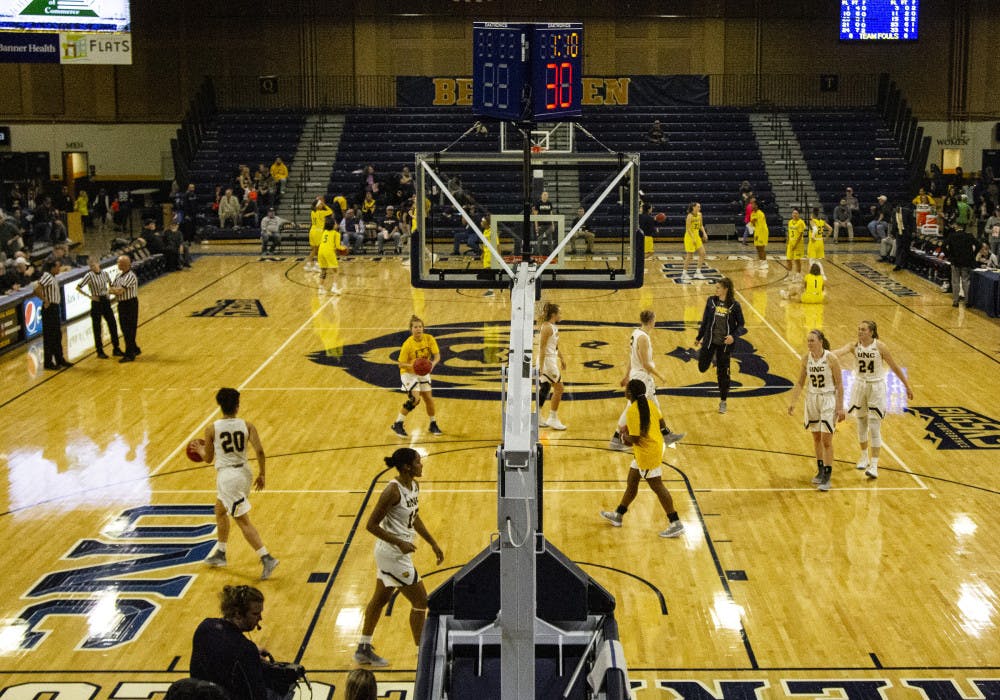Intramural sports participation is a way college students can compete and be active, without the demands and requirements of intercollegiate teams.
The University of Northern Colorado offers 10 intramural sports with both gender- specific and coed teams available.

The intramural basketball league offers men’s, women’s and coed teams, all with variations in the rules. Women’s baskets on coed teams are worth one point more than the men’s, and they receive more free throws when fouled. While this system is advantageous to the women in terms of points, some find it to be sexist and unnecessary.
Morgan McKenzie, a UNC senior, plays on a coed team called, “The Frigerators.”
She has been participating in the league for a year now and finds the rule differences between her and her male peers to be outdated and misogynistic.
“The fact that they feel the need to give women extra points for scoring just brings back this idea of women not being able to play sports as well as men,” McKenzie said. “It’s frustrating as a woman and as a basketball player.”
McKenzie added, if a woman had a concern that playing against men on equal footing was going to be unfair or an unwanted challenge, she could play in the women’s only league. Except, those who sign up for coed should be able to play by the same rules as everyone on the court.
Other female players, such as UNC senior Victoria Bright, agrees the rule differences are disrespectful and needless.

“Me and Morgan score way more than the boys do,” Bright said. “Getting extra points for the same shot doesn’t just imply we’re not as good, but it also makes it seem like there needs to be extra incentive to include women.”
The ones in favor of the rule differences argue the extra points should be welcomed, because they benefit women and the teams they play on. However, female players argue against this. The extra points do more than get the team closer to a win. Concerned women, and men, argue the rules imply women players need extra help in order to compete with men. They say this implication reinforces gender stereotypes, which many complain are already prevalent in much of the sports world.
Some may argue, in general, men have physical abilities greater than women and it wouldn’t be fair to have them compete with the same rules. However, the presence of both gender specific as well as coed teams gives players the choice. If someone feels that they should be judged differently and according to gender, that person can play on the exclusive teams.
McKenzie did acknowledge the benefit to scoring more points, but also noted that it comes at a greater cost than is earned by that advantage.
“I just don’t like the reinforcement of the idea that women need extra help to compete, especially in sports,” McKenzie said. “I feel like this is a big issue in sports in general, this idea that women can’t compete even though they prove time and time again that they can be just as good of athletes.”
Before the rec center closed and the intramural sports were canceled for the rest of the year, members of The Frigerators were planning to appeal the rule differences for the coed teams and see if they could be amended for next semester.
Other intramural sports with coed teams, such as volleyball, flag football and soccer also have different rules for women. Some of the sports do not offer women’s teams along with the men’s and coed options, so coed is the only option for women who want to play. Bright explained why she thinks this issue is important.
“I think if you asked most women players, they would say they want to play by the same rules as the men,” Bright said. “It’s like, we don’t even get the chance to prove we are just as capable because the rules have already told us and everyone else that we’re not.”
Bright recalled how she was shocked at how different the rules of the women’s game were compared to the men’s when she played lacrosse at a younger age.
“We all wished we could play with the boys’ rules,” she said. “The girl’s version is like a watered down, ultra-protective version of the game we wanted to play. If the players aren’t the ones who want it to be different, then why is it?”
UNC senior Trevor Gifford, who also plays on The Frigerators, agrees these different rules are antiquated and don’t reflect how the women playing feel.
“It just doesn’t seem right that a lot of the women who these rules apply to don’t want them and feel disrespected by them,” Gifford said. “The school needs to listen to what the actual players are saying.”
McKenzie, Bright and Gifford will be graduating this year and therefore will not be able to participate again, but their teammates do agree something should be done and will be looking into discussing the rule changes with those in charge of the games.







